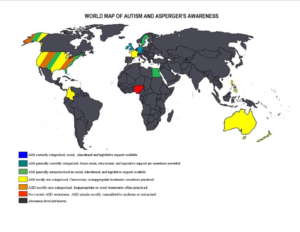Although the United States still has a way to go in how we perceive, treat, and accept autistic individuals, we are actually one of the most progressive countries when it comes to neurodiversity. This is likely due to the fact that autism is simply more well known and easily diagnosed in the U.S., whereas underdeveloped countries, like those in Africa, with less medical resources are not as aware of ASD and therefore, even though it is st ill prevalent, it often goes undiagnosed.
ill prevalent, it often goes undiagnosed.
According to a study done in Nigeria, knowledge of Autism is low even among doctors and other medical professionals. Naturally, this lack of awareness among doctors significantly decreases the amount of autistic kids who are diagnosed in Africa. Because of this lack of diagnosis, there is a stigma on autistic children in Africa that often leads to them being hidden from society. This is a tragedy because, if awareness was increased in African countries, Autistic children could be welcomed into their communities and live fulfilling lives like many do in the U.S.. Studies have shown that the symptoms of autism in African children do not vary significantly from those in North American children. The only real difference is the average age of diagnosis, which is later in African children, around the age of 8. In the U.S., the average is 4 years old. Additionally, though the symptoms do not vary, some of the causes of autism in African children are far rarer in the United States. The number of children who present with ASD symptoms as a result of sepsis or encephalitic infection is much higher in Africa, likely due to lack of medical technology and resources needed to treat the infections. Overall, however, the knowledge of what causes ASD in African kids is still pretty low due to a lack of research studies conducted in African countries. This is slowly changing and progress is being made, but it will still be a while before autism is a widely recognized condition in Africa.
Awareness can not come soon enough because, for the moment, autistic individuals in Africa are being treated despicably. According to the vice president of Autism Speaks, “We know that in some African regions, many children who

have autism are believed to be witches or possessed by demons”. This view of autistic individuals is one of the reasons that so many autistic kids are hidden away in Africa and prevented from living a normal life and socializing with other members of society. Autism Speaks is currently attempting to remedy this by training local public health workers to educate African communities about Autism and how they can help and embrace the autistic members of their communities. Researchers have suggested that in order to have the greatest effect, it is best to present information about autism in a culturally respectful way instead of simply rejecting the religious beliefs of the communities. Currently doctors are working with traditional healers and shamans to provide support to families of autistic individuals.

While African countries still have a long ways to go in their awareness and perception of autism and neurodiversity in general, progress is still being made and more developed countries are doing their best to aid and guide them along the way to ensure that one day, autistic kids can be proud members of their communities instead of being forced to hide away.
I enjoyed reading this blog post because it highlights the importance of thinking globally about autism acceptance. It’s a universal issue, not just an American issue. I think binding together and progressing forward is often lost in the tunnel vision of nationwide improvement. It would be interesting to look into Africa’s current situation (in regards to autism awareness and acceptance) as compared to America’s past.